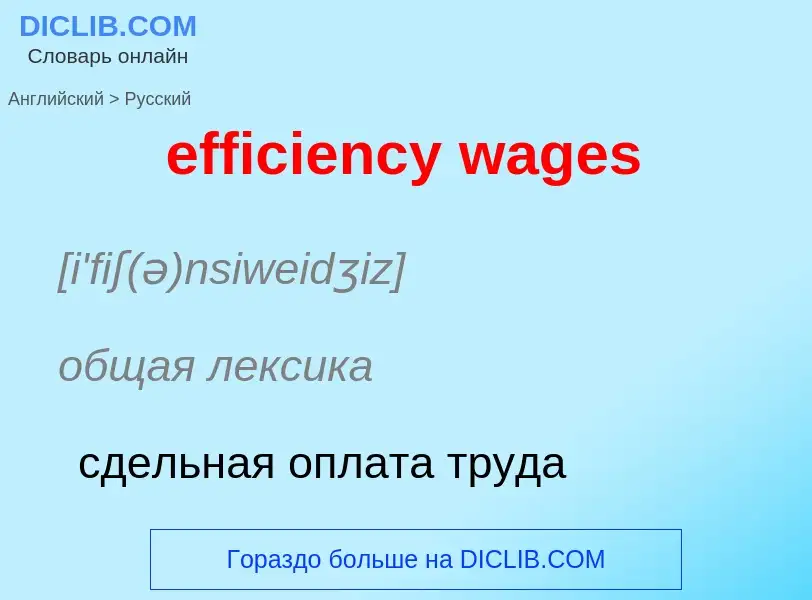Перевод и анализ слов искусственным интеллектом ChatGPT
На этой странице Вы можете получить подробный анализ слова или словосочетания, произведенный с помощью лучшей на сегодняшний день технологии искусственного интеллекта:
- как употребляется слово
- частота употребления
- используется оно чаще в устной или письменной речи
- варианты перевода слова
- примеры употребления (несколько фраз с переводом)
- этимология
efficiency wages - перевод на русский
[i'fiʃ(ə)nsiweidʒiz]
общая лексика
сдельная оплата труда
Определение
Википедия
The term efficiency wages (or rather "efficiency earnings") was introduced by Alfred Marshall to denote the wage per efficiency unit of labor. Marshallian efficiency wages would make employers pay different wages to workers who are of different efficiencies such that the employer would be indifferent between more-efficient workers and less-efficient workers. The modern use of the term is quite different and refers to the idea that higher wages may increase the efficiency of the workers by various channels, making it worthwhile for the employers to offer wages that exceed a market-clearing level. Optimal efficiency wage is achieved when the marginal cost of an increase in wages is equal to the marginal benefit of improved productivity to an employer.
In labor economics, the "efficiency wage" hypothesis argues that wages, at least in some labour markets, form in a way that is not market-clearing. Specifically, it points to the incentive for managers to pay their employees more than the market-clearing wage to increase their productivity or efficiency, or to reduce costs associated with employee turnover in industries in which the costs of replacing labor are high. The increased labor productivity and/or decreased costs may pay for the higher wages. Companies tend to hire workers at lower costs, but workers expect to be paid more when they work. The labor market balances the needs of employees and companies, so wages can fluctuate and fluctuate up or down.
Because workers are paid more than the equilibrium wage, there may be unemployment, as the above market wage rates attract more workers. Efficiency wages offer, therefore, a market failure explanation of unemployment in contrast to theories that emphasize government intervention such as minimum wages. However, efficiency wages do not necessarily imply unemployment but only uncleared markets and job rationing in those markets. There may be full employment in the economy or yet efficiency wages may prevail in some occupations. In this case there will be excess supply for those occupations and some applicants whom are not hired may have to work at a lower wage elsewhere. Conversely, if supply is less than demand, some employers will need to hire employees at higher wages, and applicants can get jobs with wages higher than the considered wages.

